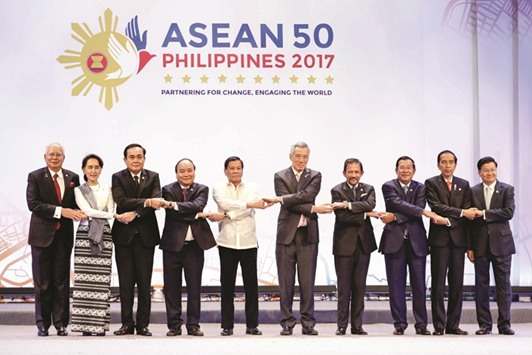Duterte, host of the one-day Association of Southeast Asian (Asean) leaders meeting, lobbied ahead of the event for much closer ties with China despite its sweeping claims to the strategically vital waterway.
China has been turning reefs and shoals in areas of the sea claimed by the Philippines and other nations into artificial islands, and installing military facilities there.
Asean members Vietnam, Malaysia and Brunei also claim parts of the sea, but China insists it has sovereign rights over nearly all of it.
Ahead of the summit Duterte said the Philippines and other nations were helpless to stop the island building, so there was no point discussing it at diplomatic events such as yesterday’s summit.
In keeping with Duterte’s position, a chairman’s statement due to be released after the summit ended would ignore a UN-backed tribunal’s ruling last year rejecting China’s sweeping claims, according to a draft obtained by AFP.
But diplomats said other Asean nations, unhappy with intense Chinese lobbying of the Philippines, sought to toughen up the chairman’s statement and there were hot debates on the issue in Manila.
“It can’t be seen that Asean has totally given in to Chinese pressure,” a Southeast Asian diplomat in Manila for the event told AFP.
The Philippines, under previous president Benigno Aquino, had lobbied hard at Asean summits for the bloc to voice its strong opposition to the Chinese expansionism, and official statements at those events often reflected that. Aquino also filed the case at the international tribunal.
But the ruling against China came after Duterte took power.
Duterte steadfastly refused to use the verdict to pressure China, instead pursuing warmer relations and billions of dollars’ worth of trade and aid.
Duterte’s chairman’s statement, which is meant to reflect the views of all Asean leaders, would voice concern but not mention the ruling nor China directly, according to excerpts of the latest draft obtained yesterday by AFP.
China, through its ambassador to Manila, had this week been campaigning to weaken it further, delegates and diplomats told AFP.
“The lobbying is quite intense. They (China) want it further watered down,” one diplomat told AFP.
China had wanted Asean to remove a reference to “respect for legal and diplomatic processes”, and it was taken out of the South China Sea section of the latest draft of the chairman’s statement seen by AFP.
Filipino diplomats said the phrase was important because “legal and diplomatic processes” encompassed the entire process of the filing of the case in the tribunal until its resolution.
Nevertheless, the new draft statement reintroduced a call for no further “land reclamation and militarisation” of the sea.
Diplomats said the reinclusion of the reference to land reclamation and militarisation meant that some Asean countries were not comfortable with “total acquiescence” to China.
“This has to be reflected in the statement,” one diplomat, who did not want to be named, told AFP.
Another diplomat said Vietnam had insisted the references to the land reclamation and militarisation be reintroduced.
Malaysia, Singapore and Brunei also wanted a stronger statement than Duterte had planned, according to another member of an Asean delegation.
By late yesterday night, more than four hours after the summit ended, the chairman’s statement had yet to be released.
Diplomats from visiting delegations told AFP that Duterte, as host, had the final say on the wording.
The summit was also closely watched for how Duterte, who has shocked with curse-laden tirades against the United States and other critics of his deadly drug war, handled hosting his first major diplomatic event.
Duterte’s drug war, which has claimed thousands of lives and led to warnings by rights groups about a possible crime against humanity, has been widely condemned in the West.
But he enjoyed support from some of his Southeast Asian guests this week, including Brunei Sultan Hassanal Bolkiah and Indonesian President Joko Widodo.

